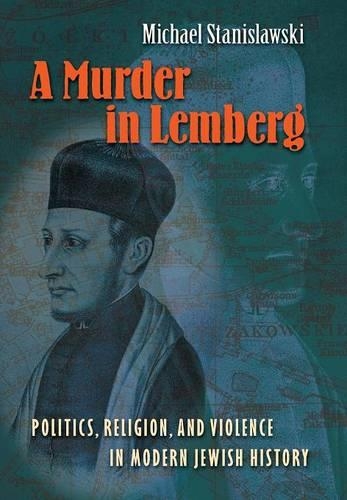
A Murder in Lemberg: Politics, Religion, and Violence in Modern Jewish History
(Hardback)
Publishing Details
A Murder in Lemberg: Politics, Religion, and Violence in Modern Jewish History
By (Author) Michael Stanislawski
Princeton University Press
Princeton University Press
16th April 2007
United States
Classifications
Professional and Scholarly
Non Fiction
Social groups: religious groups and communities
Social and cultural history
947.79
Physical Properties
Hardback
160
Width 152mm, Height 235mm
369g
Description
On September 6, 1848, Abraham Ber Pilpel entered the kitchen of Rabbi Abraham Kohn and his family and poured arsenic in the soup that was being prepared for their dinner. Within hours, the rabbi and his infant daughter were dead. This book tells the story of the murder, the trial that followed, and the political and religious fallout of both.
Reviews
"Stanislawski tells his story with a sharp eye for detail and plot, with the historical context and analysis that students of Jewish history will appreciate."--Publishers Weekly "Beyond the sheer literary pleasure of his captivating narrative and the inherent novelty of a Galitsianer Jewish murder mystery, the author adds important insights into the complex, now vanished, world that was Jewish Galicia... Michael Stanislawski has written not only an important historical morality tale about the dangers of religious extremism, but also a cautionary tale about the unforeseeable perils unleashed when governments try to force modernity, or, for that matter democracy, on a deeply traditional religious society."--Allan Nadler, Forward "Stanislawski ... could not have written this slim, fascinating book without having immersed himself in the municipal archives of Lviv, previously known as Lemberg."--Sheldon Kirshner, Canadian Jewish News "A well-paces and dramatic re-examination of the Kohn murder, Murder in Lemberg is, more importantly, a rich and vivid picture of the diverse mid-19th century Jewish life in Eastern Europe, when change was unsettling traditional communities."--Jewish Book World "In a charming and fascinating book that he has just published--A Murder in Lemberg--Stanislawski says he truly believes that this is not only a fascinating story in and of itself, but also one with abiding importance to all those interested in the modern history and the culture of the Jews, with all of its grandeur and successes, as well as its abundance of tragedy and violence...including internal violence, ultimately stretching from the assassination of Rabbi Abraham Kohn in 1848 to that of prime minister Yitzhak Rabin in 1995."--Tom Segev, Haaretz "In this concise account, Michael Stanislawski expertly uses the crime to show that ideological changes roiling the Jewish world at the time were just as fundamental as those operating on the wider scene, and that these movements acted and reacted to each other in dangerous and unpredictable ways... Stanislawski explains a very complex religious and political situation with commendable brevity and clarity."--Ralph Amelan, The Jerusalem Report "[T]he account is a highly stimulating read."--Francois Guesnet, Slavic Review "[This] book is well worth reading. For specialists, it provides a little-known incident with a strong argument. For those less familiar with the history of East European Jewry, this short book may serve as an easy and interesting introduction wrapped in a murder mystery. One way or the other, Stanislawski's study is a stimulating work and deserves broad readership."--Theodore R. Weeks, American Historical Review "A Murder in Lemberg is a comparatively short tome, yet, for the most part, it packs a powerful punch. And it is a testament to Stanislawski's skill that what might initially appear to be a parochial, if somewhat shocking, event, relevant only to its own time and place, is rendered of broader and potent meaning... [T]his is a first-rate microstudy that deserves attention beyond the academy."--Sam Johnson, H-Net Reviews
Author Bio
Michael Stanislawski is Nathan J. Miller Professor of Jewish History at Columbia University, where he also serves as Associate Director of the Institute for Israel and Jewish Studies and Chair of the Interdepartmental Program in Yiddish Studies. His books include "Autobiographical Jews and Zionism" and the "Fin de Siecle".
